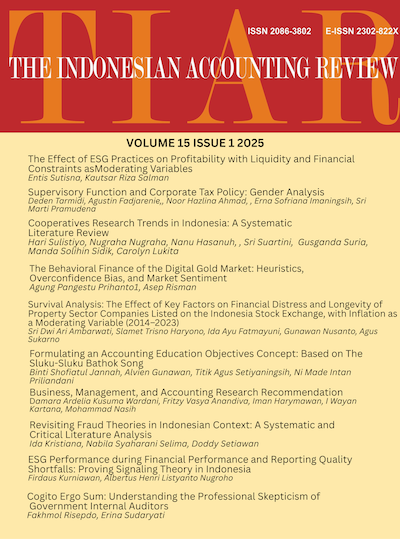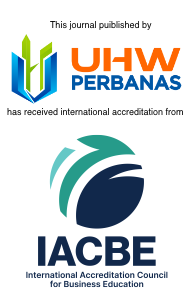Cogito Ergo Sum: Understanding the Professional Skepticism of Government Internal Auditors
DOI:
https://doi.org/10.14414/tiar.v15i1.5291Keywords:
Internal Auditor, Cogito ergo sum, Professional Skepticism, DescartesAbstract
Descartes' philosophy, famous for the phrase "cogito ergo sum" (I think, therefore I am), emphasizes the importance of critical thinking and proper doubt to achieve truth. In the context of Government Internal Auditors (APIP), critical and objective thinking enables them to conduct independent assessments. This research reveals how APIP applies professional scepticism during audits, similar to Descartes' thought process. Both aim to find truth through critical thinking and proper doubt. By applying Descartes' principles, it is hoped that APIP's professional scepticism can be strengthened, contributing to further research.
References
Ajzen, I. (1991). Theory of planned behavior. Organizational Behavior and Human Decision Processes, 50(2), 179–211.
Ajzen, I. (2005). EBOOK: Attitudes, Personality, and Behavior. McGraw-Hill Education (UK).
Ali, Y., Makur, D. S., Yusuf, F. M., & Latarang, S. K. (2020). The True Nature of Financial Statements in Cogito Ergo Sum’s Thoughts of Rene Descartes. Journal of Dimensie Management and Public Sector, 1(2), 1–12.
Apollo A. (2021). Konstruksi Filsafat Akuntansi, Dan Auditing Studi Etnografi, Dan Hermeneutika Pada Candi Prambanan Jogjakarta. JMPIS Jurnal Manajemen Pendidikan dan ilmu sosial, 2(1), 288–300. https://www.dinastirev.org/JMPIS/article/view/450
Birkin, F. (1996). The ecological accountant: From the cogito to thinking like a mountain. Critical Perspectives on Accounting, 7(3): 231–257.
Butar, S. G. A. B. (2016). Penerapan Skeptisisme Profesional Auditor Internal Pemerintah Dalam Mendeteksi Kecurangan (Studi Kasus Pada Auditor Perwakilan BPKP Provinsi Jawa Tengah).
Chariri, A. (2009). Landasan filsafat dan metodologi penelitian kualitatif. 8.Creswell, J. W. (2007). Qualitative inquiry and research design: Choosing
among five approaches. Sage publications.
Darmayasa, I. N., & Aneswari, Y. R. (2015). Paradigma interpretif pada penelitian akuntansi Indonesia. Jurnal Akuntansi Multiparadigma, 6(3), 350– 361.
Efferin, S. (2010). Triangulasi dalam Penelitian Kualitatif-Interpretif di Bidang Akuntansi: Seni Mengelola Keterbatasan.
Hanif, R. A., & Naibaho, E. R. (2014). Pengaruh Independensi, Kompetensi, Moral Reasoning dan Skeptisisme Profesional Auditor Pemerintah terhadap Kualitas Audit Laporan Keuangan Pemerintah Daerah (Studi Empiris pada BPK RI Perwakilan Provinsi Riau). Riau University.
Hertogh, C. P. (2016). Thought Experiment Analyses of René Descartes’ Cogito. Trans/Form/Acao, 39, 9–22.
Hurtt, R. K. (2010). Development of a Scale to Measure Professional Skepticism. Auditing: A Journal of Practice & Theory, 29(1), 149–171.
Hurtt, R. K., Brown-Liburd, H., Earley, C. E., & Krishnamoorthy, G. (2013). Research on Auditor Professional Skepticism: Literature Synthesis and Opportunities for Future Research. Auditing: A Journal of Practice & Theory, 32(Supplement 1), 45–97.
Kartikasari, R. N., Irianto, G., & Prihatiningtias Y. W. (2017). Penerapan Skeptisme Profesional Auditor Internal Pemerintah Dalam Mendeteksi Kecurangan di Sektor Publik (Studi Pada Auditor di BPKP Perwakilan Provinsi Jawa Timur). Jurnal Akuntansi Aktual, 4(2), 77–91.
Khan, M. J., & Oczkowski, E. (2021). The Link Between Trait and State Professional Skepticism: A Review of the Literature and a Meta?Regression Analysis. International Journal of Auditing, 25(2), 558–581.
Larimbi, D., Subroto, B., & Rosidi, R. (2013). Pengaruh Faktor-Faktor Personal Terhadap Skeptisisme Profesional Auditor. EKUITAS (Jurnal Ekonomi dan Keuangan), 17(1), 89–107–189–107.
Merawati, L. K., & Ariska, N. L. P. Y. (2018). Pengaruh moral reasoning, skeptisisme profesional auditor, tekanan ketaatan dan self-efficacy terhadap kualitas audit. KRISNA: Kumpulan Riset Akuntansi, 10(1), 70–76.
19. Muslim, M., Rahim, S., Pelu, M. F. A. R., & Pratiwi, A. (2020). Kualitas Audit: Ditinjau dari Fee Audit, Risiko Audit dan Skeptisme Profesional Auditor sebagai Variabel Moderating. Ekuitas: Jurnal Pendidikan Ekonomi, 8(1), 9–19.
Nelson, M. W. (2009). A Model and Literature Review of Professional Skepticism in Auditing. Auditing, 28(2), 1.
Nolder, C. J., & Kadous, K. (2018). Grounding the Professional Skepticism Construct in Mindset and Attitude Theory: A Way Forward. Accounting, Organizations and Society, 67: 1–14.
Olsen, C., & Gold, A. (2018). Future research directions at the intersection of cognitive neuroscience and auditors’ professional skepticism. Journal of Accounting Literature, 41, 127–141.
Quadackers L., Groot T., Wright, A. (2014). Auditors’ professional skepticism: Neutrality versus presumptive doubt. Contemporary Accounting Research, 31(3), 639–657.
Rahayu, R. A. (2020). Pengaruh Skeptisisme Profesional Audit dan Keahlian Auditor Terhadap Kualitas Audit. Jurnal Riset Akuntansi Terpadu, 13(2), 242–255.
Riyadi, A., & Sukma, H. V. (2019). Konsep Rasionalisme Rene Descartes dan Relevasinya Dalam Pengembangan Ilmu Dakwah. An-Nida: Jurnal Komunikasi Islam, 11(2).
Sanjaya, A. (2017). Pengaruh Skeptisisme Profesional, Independensi, Kompetensi, Pelatihan Auditor, Dan Resiko Audit Terhadap Tanggung Jawab Auditor Dalam Mendeteksi Kecurangan. Jurnal Akuntansi Bisnis, 15(1), 41–55.
Setiyadi, R. (2021). Paradigma Baru Pengawasan: APIP Sebagai “Strategic Partner.”
Sitorus, F. K. (2016). Rasionalisme Rene Descartes: Saya Berpikir, maka Saya Ada. Komunitas Salihara.
Susilo, D. N. (2018). Menggugat Peran APIP dalam Pencegahan Korupsi pada Pengadaan Barang dan Jasa.
Downloads
Submitted
Published
How to Cite
Issue
Section
License
Copyright (c) 2025 The Indonesian Accounting Review

This work is licensed under a Creative Commons Attribution-NonCommercial 4.0 International License.

















